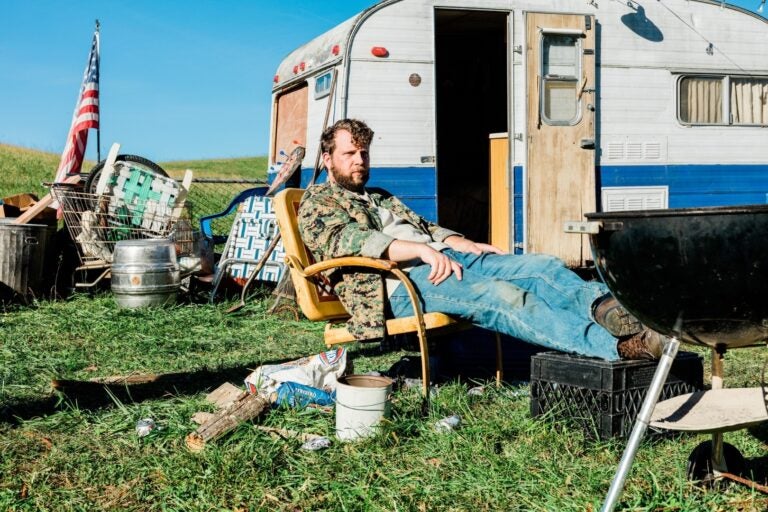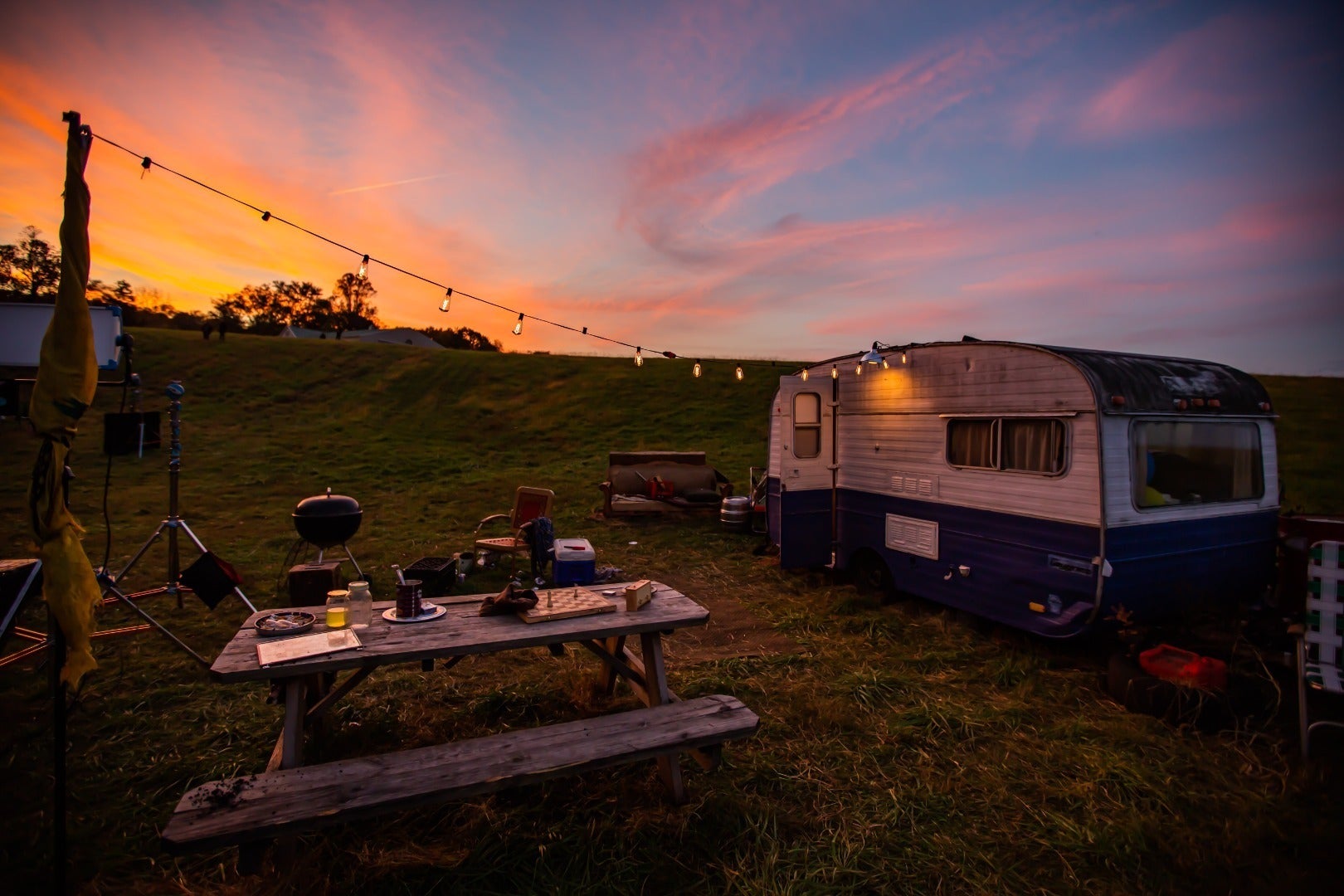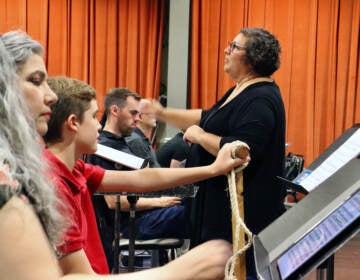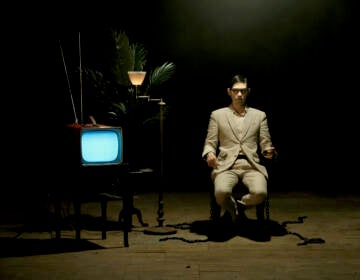Opera Philadelphia uses ‘Soldier Songs’ to explore post-traumatic stress
The opera-turned-film is based on interviews with combatants in five different American wars.

Jonathan McCullough (Dominic Mercer)
“Soldier Songs” starts with a shot of a large tree in an empty field in late October, slightly right of center. Its leaves have fallen, showing off the lines of craggy branches. At first, you hardly notice the small figure on the left, dwarfed by the towering tree. The character, simply named Soldier, hesitates before moving toward the tree.
Next we see that Soldier lives in a trailer, surrounded by a picnic table, a grill, a lawn chair, and a smattering of junk. There is nothing else around him but the open field.
“He’s a solitary person,” said Jonathan McCullough, a baritone opera singer who both plays Soldier and makes his directorial debut with this film adaptation of the opera. “He’s someone who has signed up for service and now is experiencing symptoms of PTSD.”
McCullough’s film will premiere on Opera Philadelphia’s digital streaming channel, which launched in November in response to the shuttering of live performance venues during the coronavirus pandemic. “Soldier Songs” is the third film to debut on the channel, and the first to be shot on-location.
“This is the first fully cinematic project,” said Opera Philadelphia general director and president David Devan.
Opera Philadelphia had filmed versions of Lawrence Brownlee and Tyshawn Sorey’s “Cycles of My Being” and Lee Hoiby’s “Bon Appétit!” on a soundstage for the channel, but “Soldier Songs” has been given what Devan calls “HBO treatment.”
“Is there an opportunity… to create and develop a progressive part of what opera could look like in the future?” he asked. “Soldier Songs is a stake in the ground for that, for people to see what our vision is for the channel.”
First premiering in 2011, “Soldier Songs” was created by David T. Little, who began writing the piece by interviewing friends and family – both men and women – who saw combat as soldiers. Collectively they witnessed five wars: World War II, the Vietnam War, the two Gulf Wars, and Afghanistan.
“I started out wanting to understand why certain people I grew up with chose to enlist in the military,” said Little. “It was never a decision I would have made. Growing up, I felt like the military was distant from my experience, but then realizing it was very close to me. I had very good friends who were now part of it.”
Little says he wrote both the music and libretto for Soldier Songs to show war’s effect on the people who fight. Written for a single singer and a seven-piece ensemble, the opera is a song cycle for one composite character – Soldier – representing the stories of five soldiers.
“It doesn’t start with enlistment, it starts at age 6,” said Little. The songs describe boys playing with toy guns and violent video games, and old men grappling with the after-effects of combat. “We follow this abstract character, Soldier, from age 6 to 66.”
McCullough had performed the part of Soldier for one song during a workshop a few years ago at Carnegie Hall. It resonated with one of his personal concerns: post-traumatic stress disorder.
“It started with my fiancé, who is a psychiatrist, working in the VA,” said McCullough from his home in Providence, Rhode Island. “She ends up learning about opera, and I end up learning about psychiatry.”
“Seventeen vets die by suicide every day,” he continued. “Why is that number so high? I want to get people to ask these questions so we can lower that number as a society, together.”

While Soldier Song is not only about PTSD, McCullough wanted to use the piece to draw awareness to the ravages of that disorder. Instead of performing it on a stage in a music hall or auditorium, he conceived a mobile production where a small RV trailer could serve as both the set and the transportation. McCullough could pull into any parking lot, field, or clearing and put on a performance.
“I wanted to find a way where this can be done on a budget, and still be visually effective,” said McCullough. “The trailer is 90% of the set. It’s supposed to be old, dirty, and grimy.”
Opera Philadelphia saw that McCullough’s production concept could be adapted effectively into a film production. The company found an appropriately dilapidated trailer and began preparing to fabricate an open field on a soundstage, when a lightbulb went off:
“Why are we trying to create the atmosphere this is designed to be set in?” asked McCullough. “Why not just shoot it there?”
“We were, like, ‘Duh!’ That’s a great idea,” said Devan.
One of Opera Philadelphia’s board members is involved with the Brandywine Conservancy, which oversees undeveloped lands in and around the historic Brandywine Battlefield, the site of the one of the largest and longest-fought battles of the Revolutionary War.
McCullough said he didn’t realize the location selected for his film about war was an actual battlefield until about mid-way through the production. The content of the opera makes no reference to the Revolutionary War, and there are no visual cues about where this beat-up trailer is parked. Nevertheless, McCullough says the location lent an aura of authenticity to the production.
“There is one scene, ‘Steel Rain.’ It’s a soundscape that makes you feel you are in a war scene. I crawl on the ground. As we were filming I thought, ‘This is the same soil that the bloodiest battle of the Revolutionary War was fought on.’”
Little had not written his opera with a certain location or a trailer in mind. He wrote it loosely enough that directors and producers can interpret it as they wish. After 17 years of preliminary workshops, premieres, and subsequent productions, he has seen his opera through a lot of iterations.
He says he likes what McCullough has done with his work.
“It’s a very special piece to me. It means a lot to see the care that Jonathan has taken with it,” he said. “Even if he definitely has a certain perspective on it, and has entered it through a lens of illness and PTSD, and a concern for veteran suicide rates – that’s a real issue – I like that the piece can mean different things to different people.”
The voices of the people Little interviewed have always been part of “Soldier Songs.” A pre-recorded track his family and friends is part of the composition, and is featured in the film. One of them is his grandfather, who passed away last year.
Since he conducted those interviews almost two decades ago, Little has not done follow-up interviews with them. He says generally when he talks to family and friends in the military, they avoid the topic of war.
“I had this sense, over the years, that we don’t need to talk about this again,” he said. “I always made a point, if the show is happening in somebody’s area, to extend an invitation to see the show. Usually people I’ve interviewed are, like, ‘I’m OK. Thank you, but I don’t need to see it.’
“It is a challenging work emotionally, and sonically it can be aggressive. Some moments are simulating combat, which, if you have experienced combat, can be very difficult. We always put warnings up about that, so they know that this part of the show,” said Little.
“Soldier Songs” will launch on Opera Philadelphia’s digital channel Friday, Jan. 22, available by subscription until May 31.

Get daily updates from WHYY News!
WHYY is your source for fact-based, in-depth journalism and information. As a nonprofit organization, we rely on financial support from readers like you. Please give today.






